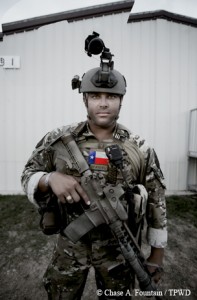The Texas Parks and Wildlife Department (TPWD) has a newly minted SWAT team. To be sure, the agency maintains that this “cadre of specialty teams” will focus on search-and-rescue missions. However, the way Game Warden Cullen Stakes is dressed in the photo above makes it pretty clear that he’s not getting ready to rescue people who have been stranded by floods, or have gotten lost in the woods.
Among the TPWD’s specialized units is the “Scout Team,” a group of 25 wardens who “have received a variety of training and can be used in border operations, dignitary protection, or any form of high-risk law enforcement, such as serving felony arrests or hostage situations,” explains Texas Parks & Wildlife magazine.
“We can have a team anywhere in Texas in four hours, and that’s the worst-case scenario,” boasts Law Enforcement Special Operations Chief Grahme Jones. “A lot of times it’s much faster.”
For public consumption, the TPWD’s einsatzgruppen are portrayed as kindly people who will pluck terrified children from rooftops during floods, or come to the aid of people whose boats have broken down. However, the agency’s 532 wardens are “fully commissioned peace [sic] officers” who “have long assisted local authorities and state agencies,” observes Texas Parks & Wildlife. In other words: They’re cops, which means they are agents of officially sanctioned violence.
Jones points out that in addition to looking for “game and fish law violations,” wardens also “assist with community policing.” The last is an anodyne phrase that should be terrifying to reasonably well-informed people.
The government that afflicts Texas is run by extravagantly punitive people with a penchant for criminalizing practically everything. Several years ago, this anti-social compulsion led the Texas Legislature to enact a measure that would literally make a felony out of telling a fish story: A participant in a fishing tournament who exaggerates the size of his catch could be sent to prison for ten years, and be fined up to $10,000.
Obviously, tournament organizers who offer cash prizes have a powerful incentive to prevent fraud of this kind, and thus can be trusted to enforce their own rules and disqualify cheaters. But this isn’t satisfactory to the state’s “Better living through official coercion” constituency, who eagerly seize on any excuse to expand the roster of offenses that could give rise to an exercise in police overkill.
Significantly, the sponsor of the “make a fibbing fisherman a felon” law, Texas state representative Dan Flynn (a Republican, natch) admitted that “everybody always exaggerates … the size of their fish.” This means that every time somebody drops a hook and then reels in a fish, he’s a potential suspect – and thus a worthy target for a pack of armored, heavily armed wardens eager to show off their newly acquired tactical skills.
(Thanks to Mark Carroll for the tip.)
5:40 pm on January 8, 2014



